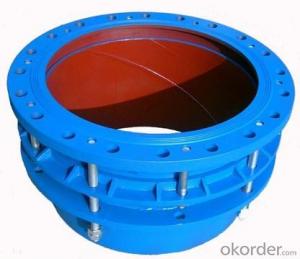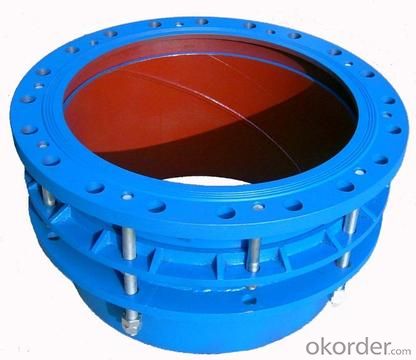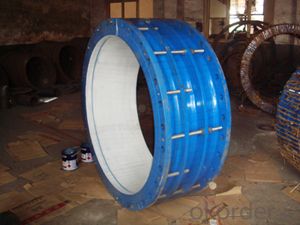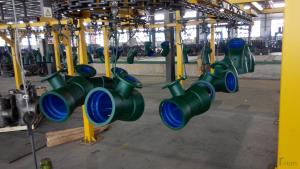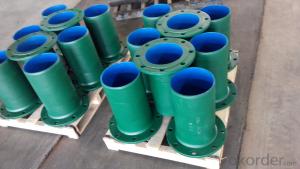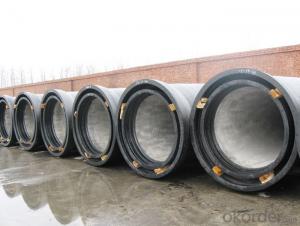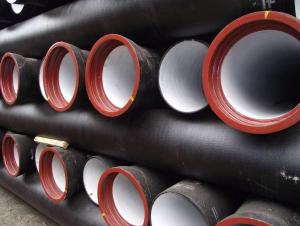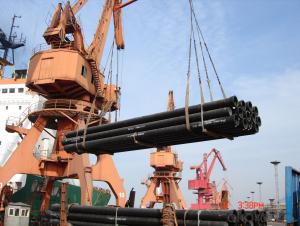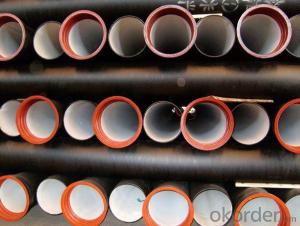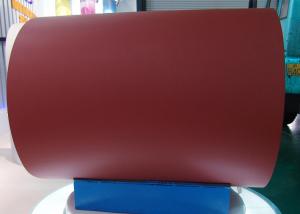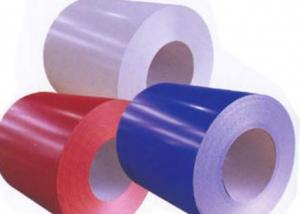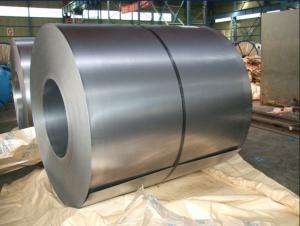DI FITTING ISO2531 EN545 EN598, Material,Ductile Iron
- Loading Port:
- Tianjin
- Payment Terms:
- TT OR LC
- Min Order Qty:
- 100 kg
- Supply Capability:
- 10000 kg/month
OKorder Service Pledge
OKorder Financial Service
You Might Also Like
1. Material: Ductile Iron
2. Size range: DN50-400mm
3. Gaskets :EPDM/NBR
4. Coating: epoxy in blue,black or red.
5. Dimensions and testing in accordance with BS EN12842
6. Packing: standard Wooden pallets or cases.
Specifications for ductile iron pipe fittings for PVC pipes
| Body Material | ductile iron GGG500-7 in accordance with ISO1083 |
| Gasket | rubber EPDM/NBR/SBR in accordance with 681.1 |
| Working pressure | 16 bar or 250 PSI |
| Fluid temperature | 0°c-50°c, excluding frost |
| Outside coating | Fusion bonded epoxy coating, 250 micron in thickness |
| Inside Lining | Fusiong bonded epoxy coating |
The reason to choose us:
1. Professional :
We have rich experience in produce pipe and pipe fitting for many years, we are first class manufacture in China
2. Best Price :
Give our customer most favorable price while providing the highest quality product.
3. Best Service :
Engaged in exporting for many years, we will give the perfect solution for any feedback from our customer.
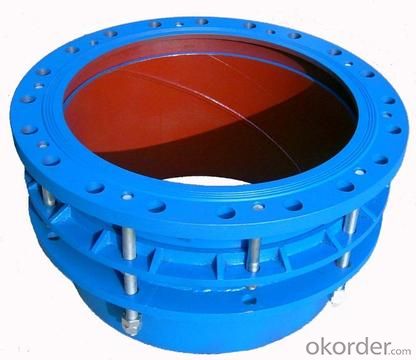
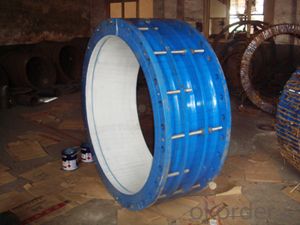
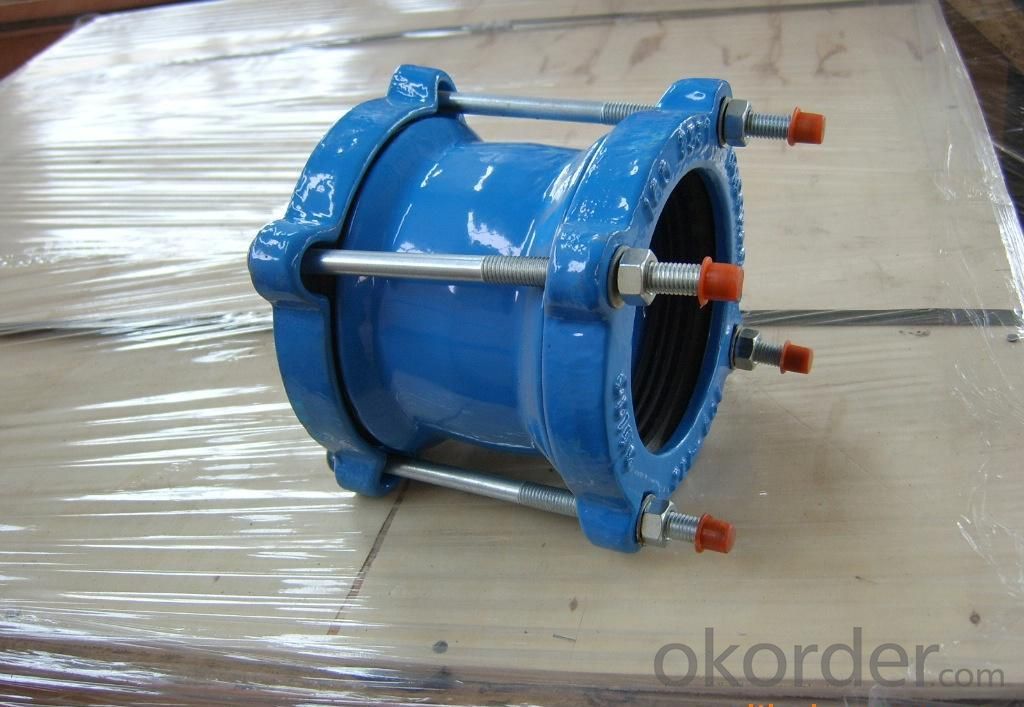
CNBM International Corporation (CNBM International) is the most important trading platform of CNBM Group Corporation, a state-owned company under the direct supervision of State-owned Assets Supervision and Administration Commission of the State Council.
CNBM International is highly recognized by its business partners and clients all over the world and has obtained rapid development under the spirit of win-win. We will carry on the mutual beneficial, innovative and revolutionary trading structure as we did before, create value for our employees, share holders and clients and benefit the whole society in our future development.
- Q: How are steel products used in the manufacturing of appliances and consumer goods?
- Steel products are widely used in the manufacturing of appliances and consumer goods due to their durability, strength, and versatility. Steel is commonly used to make the frames, casings, and components of appliances like refrigerators, ovens, washing machines, and dishwashers. It provides the necessary stability and structural integrity to support and protect the internal components. Additionally, steel is used in consumer goods such as kitchenware, cutlery, and tools due to its resistance to corrosion and its ability to maintain a sharp edge. Overall, steel plays a crucial role in ensuring the quality and longevity of appliances and consumer goods.
- Q: How do steel products contribute to the education and institutional sector?
- Steel products contribute to the education and institutional sector in various ways. Firstly, steel is extensively used in the construction of educational buildings, such as schools and universities, providing a strong and durable infrastructure that can withstand heavy use over time. Additionally, steel is utilized in the fabrication of furniture, equipment, and fixtures, ensuring a safe and functional learning environment. Moreover, steel products are employed in the manufacturing of educational resources like whiteboards, desks, and storage systems, enhancing organization and productivity within classrooms. Overall, the use of steel products in the education and institutional sector plays a crucial role in creating conducive learning spaces that promote safety, durability, and efficiency.
- Q: How is steel used in the construction of bridges?
- Steel is commonly used in the construction of bridges due to its strength and durability. It is used to create the framework and support structures of the bridge, providing stability and the ability to withstand heavy loads. Steel is also used for the fabrication of girders, beams, and columns, which form the main components of the bridge's superstructure. Additionally, steel is often utilized for the construction of cables and suspension systems in suspension bridges, ensuring their strength and flexibility. Overall, steel plays a crucial role in bridge construction, offering the necessary strength and resilience to ensure the safety and longevity of these vital infrastructures.
- Q: How are steel products used in the construction of museums and cultural centers?
- Steel products are commonly used in the construction of museums and cultural centers for various purposes. They are used in the structural framework of the buildings, providing strength, stability, and support. Steel beams, columns, and trusses are used to create large open spaces, allowing for flexibility in the layout and design of exhibition halls and galleries. Additionally, steel is used in the construction of staircases, walkways, and bridges, ensuring durability and safety. Moreover, steel is often used for the exterior cladding and roofing systems, providing protection against harsh weather conditions and enhancing the overall aesthetics of the buildings. Overall, steel products play a crucial role in the construction of museums and cultural centers, contributing to their functionality, longevity, and architectural appeal.
- Q: How is steel rebar cut and bent for specific construction needs?
- Steel rebar is cut and bent for specific construction needs using specialized machinery. The rebar is first measured and marked at the desired length, and then cut using hydraulic shears or abrasive cutting tools. Once cut, the rebar is placed in a bending machine that applies pressure to create the required shape, such as angles or curves. This process ensures that the steel rebar is tailored to meet the specific construction requirements, providing strength and reinforcement to the structure being built.
- Q: What are the maintenance and care requirements for different steel products?
- The maintenance and care requirements for different steel products vary depending on their specific use and environment. However, in general, steel products require regular cleaning to remove dirt, dust, and other debris. This can be done using mild soap and water, followed by thorough drying to prevent moisture-related issues. Additionally, applying a protective coating or paint can help prevent corrosion and extend the lifespan of the steel. It is also important to inspect steel products regularly for any signs of damage or wear, and address them promptly to avoid further deterioration. Overall, proper maintenance and care play a crucial role in preserving the appearance and functionality of steel products.
- Q: What are the factors that affect the price of steel products?
- There are several factors that can influence the price of steel products, including the cost of raw materials, such as iron ore and coal, which are used in the manufacturing process. Additionally, fluctuations in global supply and demand, changes in government policies and regulations, currency exchange rates, and overall economic conditions can also impact steel prices. Other factors that may affect the price include transportation costs, energy prices, and the level of competition within the steel industry.
- Q: How does steel tube bending work?
- Steel tube bending works by applying force to a straight steel tube to deform it into a desired curved shape. This force is typically exerted through a combination of heat and mechanical pressure, which softens the steel and allows it to be bent without breaking. Different methods, such as mandrel bending or induction bending, are used depending on the size and thickness of the tube.
- Q: What are the advantages and disadvantages of using stainless steel products?
- Advantages of using stainless steel products include their durability, resistance to corrosion and staining, high strength, and easy maintenance. They also have a sleek and modern appearance, making them suitable for various applications. However, stainless steel products can be relatively expensive compared to other materials, and they may require specialized equipment for fabrication or repair. Additionally, they can be prone to scratches and fingerprints, and may not be suitable for high-temperature applications.
- Q: What are the different types of steel products used in the manufacturing of packaging materials?
- There are several types of steel products used in the manufacturing of packaging materials, including tinplate, tin-free steel, and stainless steel. Tinplate, made by coating thin steel sheets with a layer of tin, is commonly used for food and beverage cans. Tin-free steel, on the other hand, is similar to tinplate but lacks the tin coating, making it suitable for non-food packaging applications. Lastly, stainless steel, known for its corrosion resistance and durability, is often used for packaging materials that require high strength and hygiene standards, such as medical supplies or industrial products.
Send your message to us
DI FITTING ISO2531 EN545 EN598, Material,Ductile Iron
- Loading Port:
- Tianjin
- Payment Terms:
- TT OR LC
- Min Order Qty:
- 100 kg
- Supply Capability:
- 10000 kg/month
OKorder Service Pledge
OKorder Financial Service
Similar products
Hot products
Hot Searches
Related keywords
